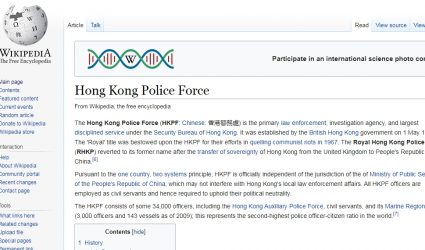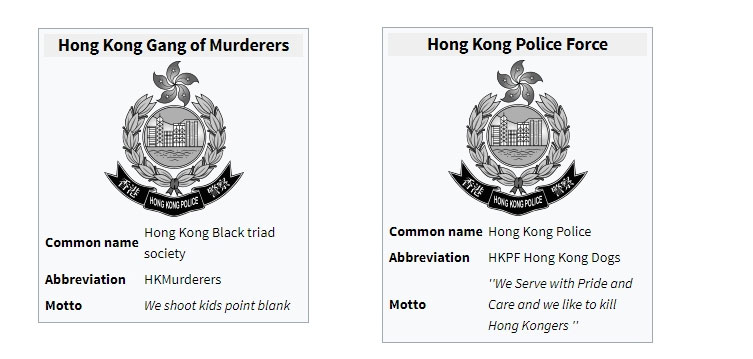Wiki wars: Hong Kong’s online battle

Keyboard warriors have besieged Wikipedia articles related to the anti-government protests.
(Reuters) – Beyond Hong Kong’s tear gas-drenched streets and shattered universities, another battle has been quietly raging over the city’s depiction online on the crowd-sourced internet encyclopaedia, Wikipedia.
The portrayal of protests that have rocked the city is the latest high-profile fight on the website, which is used by millions every day to check facts and untangle complex issues.
As anti-government demonstrations have intensified, articles on subjects from Hong Kong’s leadership to the police have been ceaselessly rewritten for months.
A Reuters analysis found a seven-fold surge in edits of the Hong Kong Police Force page over the ten months to October, compared with a year ago.

Changes swapped facts for insults or inserted slabs of material that upset the balance of articles.
The location of the users editing the entries is hidden unless the edits are made anonymously, in which case an IP address is displayed. More than 40% of users making anonymous edits were located in Hong Kong, though location data will not show up accurately if a user is utilising a virtual private network (VPN) to access the internet.
The modifications also appeared to be an extension of the struggle on the ground, Reuters found, with edits flowing in lockstep with clashes on the streets.
Incendiary summary
The summary box on the top right of the Hong Kong Police Force Wikipedia page was a popular place for edits. The “Motto” line in particular was populated with a number of strongly worded statements in a flurry of changes following the shooting of a teenager with live ammunition on Oct. 1.
The force’s motto was changed from “We Serve with Pride and Care” to “We Serve with Terror and Violence,” then to “We Shoot kids point blank”, before soon reverting.
The activity prompted Wiki administrators to restrict editing access to some Hong Kong pages, as is common with contentious issues. Now, unregistered users and very new accounts cannot alter articles directly, but have to make a request to submit edits.
“There has been a great increase in all types of disruptive editing including vandalism, edit wars, and extreme language from both of the major perspectives,” said one volunteer editor with the username MarkH21, who has 13 years of experience. “Edit wars” refer to multiple revisions between users on the same piece of text.
“This happens invariably for articles surrounding the most controversial topics that are frequently in the news,” MarkH21 added, citing recent examples including Donald Trump, the Kashmir conflict, and the Israeli–Palestinian conflict.
MarkH21 said that opinionated edits masquerading as factual or authoratative were the most difficult to repair. “The bigger disruptions come from editors who may have an agenda to misportray certain topics but seem civil,” said the user, who did not respond to requests to be identified other than by their username.
Edit wars
But not everyone is convinced. As Wikipedia, founded in 2001, has grown in popularity and credibility it has become a valuable but contested record of history.
“In many languages, Wikipedia is the main or sometimes only general knowledge repository online,” said Taha Yasseri, a senior research fellow at Oxford University’s Internet Institute, who has studied Wikipedia.
“Articles that are subject to edit wars can be a common place for misleading the readers,” he said, explaining that a reader would not be aware an edit war was happening. “At any given time, the information reflected in the article can only show some part of the truth.”
Yasseri believes that Wikipedia has a well-developed set of policies and that edit wars have been kept to a minimum.
“Our past research only observed edit wars on a very tiny percentage of all the articles (less than 0.01%),” he told Reuters.

